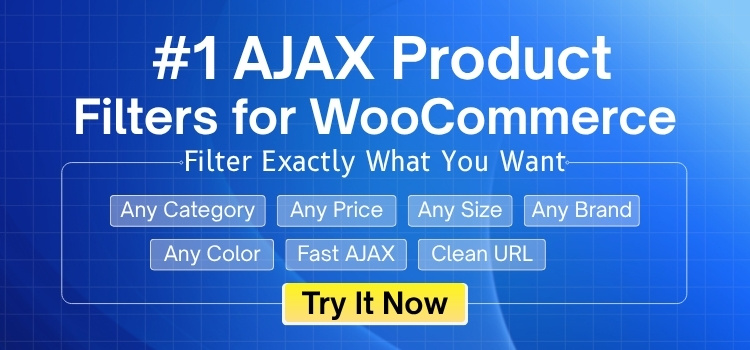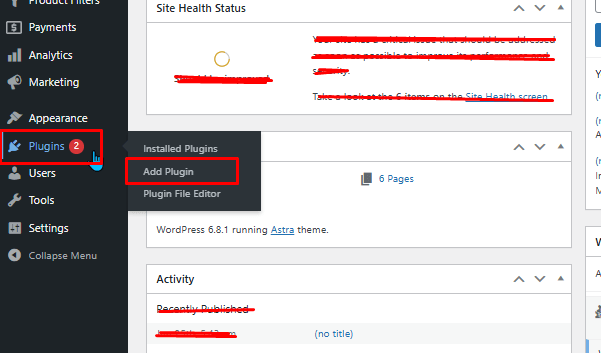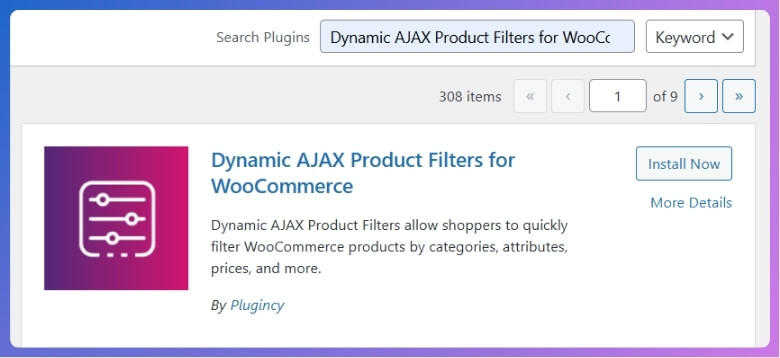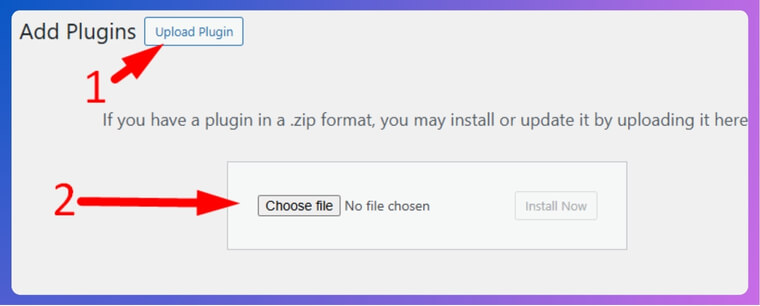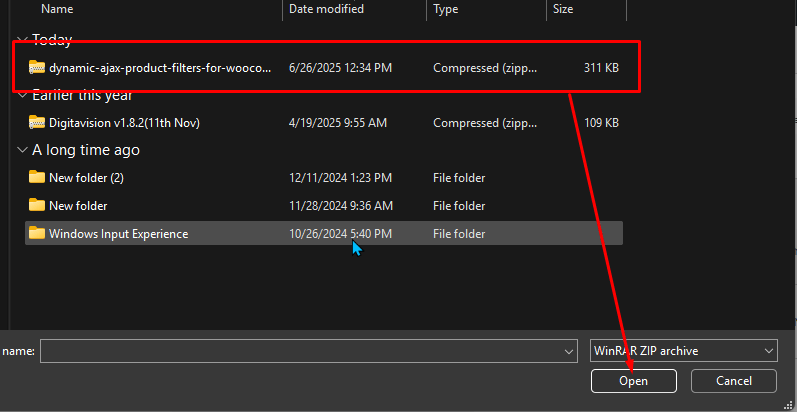Shopping online becomes easier when filters help show only the things people want. That’s why many WooCommerce stores use something called a product filter plugin. It organizes items based on things like price, color, or size. If you’re running a store, you might be wondering what is WooCommerce product filter plugin?
A WooCommerce product filter plugin helps shoppers sort products by price, size, brand, and more. It shows results instantly, improves search, and increases sales. These plugins are easy to install, match your theme, and work smoothly with your store.
If you’re curious about how this tool works or if it’s right for your store, you’re in the right place. This article shares all the details that matter—from setup to benefits—so you won’t miss anything. Keep reading to find every important point explained clearly.
What is WooCommerce Product Filter Plugin?
Finding the right item can sometimes be confusing and take a long time in large online stores. That’s where product filters come in—they help make shopping easier. Let’s explore how these filters actually work in your store.
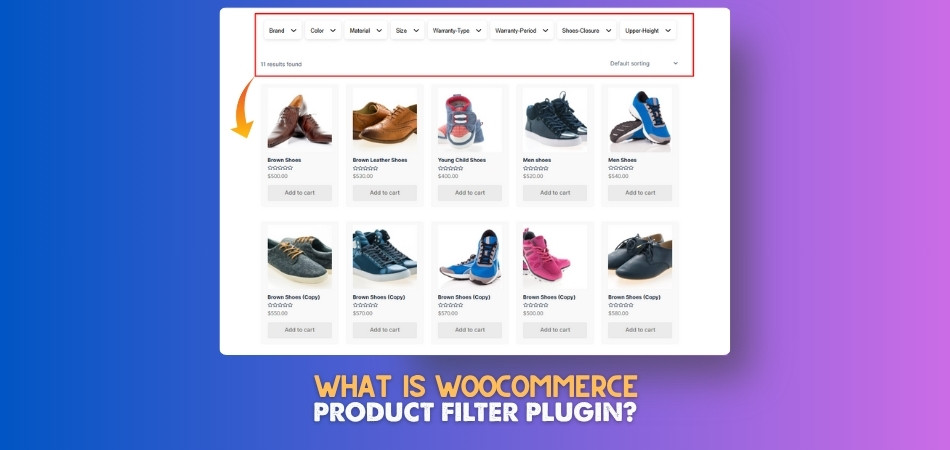
Filter Choices
Online stores often have lots of different items. To help shoppers sort through them, product filter plugins offer choices like price, size, color, brand, and more. This way, customers don’t have to scroll through everything. They can pick what they’re looking for and see only those results. It’s a simple way to keep things organized. When people find what they want faster, they’re more likely to stay and buy something.
Real-Time Results
Not all plugins require a page reload to show results. Some work instantly, making the shopping experience much smoother. This quick update feature is made possible by tools like woocommerce AJAX product filter, which lets the page show filtered items without needing to refresh. Customers can select what they want and see changes right away. That saves time and makes the process feel faster and easier.
Easy Setup
Adding a product filter plugin doesn’t mean you have to be an expert. Most of them are made for regular users, so they come with simple setup options. You can install and use them right from your WordPress dashboard. There’s usually a step-by-step guide to help. Once it’s ready, you can start using the filters without touching any complex code or settings.
Smooth Integration
These plugins are built to work well with WooCommerce. They connect directly with your existing products, categories, and tags. That means you don’t have to re-enter any information. Everything is pulled from what you already added to your store. This saves time and ensures your filters always stay in sync with your shop. It’s all done in the background without extra steps.
Custom Look
You don’t have to settle for the same design everyone else has. Most filter plugins allow some customization. That means you can change the style, colors, and layout of the filters to match your store’s theme. It helps keep your website looking neat and professional. A clean design also makes things easier for customers to use, which keeps them coming back.
Better Search
Sometimes, people leave a store just because they can’t find what they want. A good filter plugin solves this problem. It helps them see only the items that fit their needs. Whether they’re looking for a specific price or a favorite color, they don’t have to go through every page. This makes shopping faster, less stressful, and more enjoyable.
Boost in Sales
When customers get to what they need quickly, they’re more likely to buy. That means product filters can directly help increase your sales. Instead of losing interest halfway, people stay longer and complete their purchase. These small changes can lead to big improvements for your store’s performance. And happier buyers usually mean more profit.
Keep People Interested
No one likes to waste time. If someone visits your site and can’t find anything easily, they might just leave. Filters make sure that doesn’t happen. With organized search tools, users can look through your store in a way that feels smart and simple. They stay longer, explore more, and enjoy the process, which keeps them engaged and more likely to come back.
Easy for Everyone
You don’t need to be a tech expert to use these filters. And your customers don’t need instructions to figure them out. Everything is designed to be user-friendly. Whether it’s a first-time visitor or a frequent shopper, everyone can make the most of the filtering options. That’s what makes them such a valuable part of any WooCommerce shop.
Here are a few popular plugins:
- Dynamic AJAX Product Filters for WooCommerce
- Product Filter by WBW
- YITH WooCommerce Ajax Product Filter:
- HUSKY – Products Filter Professional for WooCommerce:
- Premmerce Product Filter for WooCommerce
- WooCommerce Product Filters by Barn2
Filters do more than just organize products—they improve how people shop on your site. When things are easier to find, customers feel more confident about buying. That means more sales for your store without extra effort. Adding the right filter plugin is a smart move for any WooCommerce site.
What Are the Key Features of a Good WooCommerce Filter Plugin?
When there are too many products listed, online stores can occasionally appear a little disorganized. A good WooCommerce filter plugin brings order and makes things easier. Let’s check what features really matter and why you should care.
Ajax Support
Clicking on a filter and waiting for the whole page to reload feels old and slow. That’s why Ajax support is a must-have. It updates the product list instantly, right after a filter is selected, without reloading the page. It keeps things smooth and quick. That’s also one of the key reasons to use WooCommerce product filter plugins, since speed matters a lot when people are shopping online.
Mobile Responsiveness
Not everyone shops using a computer. Phones and tablets are now super common, so your filter plugin needs to work on all screen sizes. A mobile-responsive plugin automatically adjusts buttons, layouts, and filter bars to fit smaller screens. This keeps everything readable and easy to use. A responsive design also helps make sure filters don’t break or overlap other content, which can confuse or annoy users.
Multi-Attribute Filtering
Sometimes people want to pick more than one option. That’s why multi-attribute filtering is so useful. It lets users select several filters at once, like color, size, brand, and price. With this feature, they don’t have to go back and restart their search every time. It keeps their choices saved and updates results as more options are added. This kind of flexible filtering helps users find exactly what they want faster.
Customizable Filter Layouts
Every store has its own look and feel, and filters should match that. A good plugin gives layout choices like sidebars, dropdowns, or horizontal toolbars. It also lets you change colors, spacing, and labels. This way, you can make sure your filters blend in nicely with your theme. You won’t need to worry about weird placement or design issues when the plugin lets you adjust how everything appears.
Compatibility with Page Builders
Many shops use page builders like Elementor, Divi, or WPBakery. A good filter plugin must work well with these tools. It should let you add filters using shortcodes or blocks, without breaking your page layout. Compatibility like this also helps when updating plugins or switching themes. You won’t need to fix things manually or deal with errors every time something changes behind the scenes.
Even if your store has hundreds of items, finding the right one shouldn’t feel hard. These features help build a smooth, modern shopping experience that works on any screen. Filters that are fast, flexible, and easy to use make a big difference. Pick a plugin with these key features, and your store will be ready for any shopper.
Are WooCommerce Filter Plugins Easy to Install and Use?
Adding a product filter to your WooCommerce store can make shopping easier for your customers. With just a few simple steps, you can install a filter tool that helps users find exactly what they’re looking for, without any hassle.
Choosing the Right Filter Plugin for Your Store
When it comes to improving product search on your WooCommerce store, using a smart filter plugin can make a big difference. One popular option many store owners prefer is Dynamic AJAX Product Filters for WooCommerce. It offers fast filtering, smooth performance, and flexible display options—all without needing advanced technical skills. Installing it is simple, and there are multiple ways to do it depending on your comfort level.
1. Installing via WordPress Plugin Directory (Free Version)
This is the quickest and easiest method for most users:
- Go to your WordPress Admin Dashboard and click on Plugins.
- Select Add New Plugin.

- Type Dynamic AJAX Product Filters for WooCommerce in the search bar.
- Click Install Now when the plugin appears.

- After the installation is complete, click Activate.
2. Installing the Pro Version via Plugin Upload
Use this method if you’ve purchased the premium version of the plugin:
- In your WordPress Dashboard, go to Plugins and select Add New Plugin.
- Click on Upload Plugin.

- Hit Choose File and select the plugin ZIP file you received after purchase.

- Click Install Now.

- Once installed, click Activate to enable it.
3. Manual Installation Using FTP (Advanced Method)
If you’re comfortable working with FTP, here’s how to install the plugin manually:
- Download the plugin ZIP file from your account or the WordPress repository.
- Extract the ZIP file on your local device—this gives you a folder like dynamic-ajax-product-filters.
- Open an FTP client (e.g., FileZilla) and connect to your server using your credentials.
- Go to the /wp-content/plugins/ directory on your server.
- Upload the entire extracted plugin folder there.
- Go back to WordPress Dashboard > Plugins > Installed Plugins.
- Find the plugin in the list and click Activate.
Whether you prefer a quick one-click setup or manual installation via FTP, this plugin makes the process simple. Once activated, you’ll be able to offer faster, smarter product filtering that helps customers find exactly what they need.
Can You Use WooCommerce Filters Without a Plugin?
Product filters can occasionally be added to your WooCommerce store without the need to install a plugin. While it’s possible to do that, there are some important things you should know first. Let’s look at how it actually works.
Getting Started
To begin, log in to your WordPress dashboard using your admin account. After that, go to the Posts section and click on All Posts. Here, you’ll need to look for a block or option called Product Filter. If you find it, you can easily drag and drop it onto your post or page. This gives you a basic filter layout.
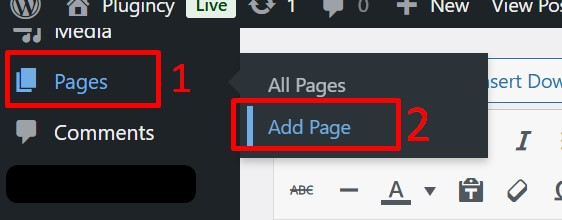
Filter Options
The built-in method does not give you many filter choices. You might only get a few basic ones like price, category, or tag. This is okay for very small stores, but it may not be enough for larger shops. Most of the time, users prefer filters that can handle color, size, rating, or stock status, which are not available here.
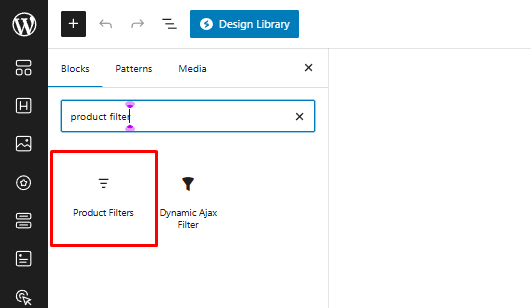
Customization Limits
When you don’t use a plugin, changing the look or behavior of the filter can be hard. You won’t be able to use dropdowns, swatches, or other fancy styles. The options you get are fixed, and there isn’t much room to personalize how it appears or works. That can make it hard to match your store’s design or improve the shopping experience.
Who It Works For
This no-plugin option works best if your store is small and you just need something simple. If you have fewer products and you don’t need detailed filters, it can get the job done. But as your store grows or if customers want more filter control, this method might not be enough. That’s when many people switch to plugins.
What to Expect
Don’t expect a lot of control or special features when using this built-in filter method. It’s very basic and not ideal for all types of stores. Still, it’s good to know the option exists. You can always try it first and later decide if you need something more powerful. If you’re curious, it’s worth testing out to see how it fits.
Using filters without a plugin can be a quick way to get started. It’s a simple option if you only need basic filtering. But if your store has many products, you might feel the need for more features. In that case, adding a plugin later is always an option.
Do Product Filters Slow Down Your WooCommerce Site?
Sometimes your website feels slower after adding new features like filters. It’s easy to worry if filters are the reason behind it. They help shoppers, but they also run background tasks. Let’s explore how this works in a simple way.
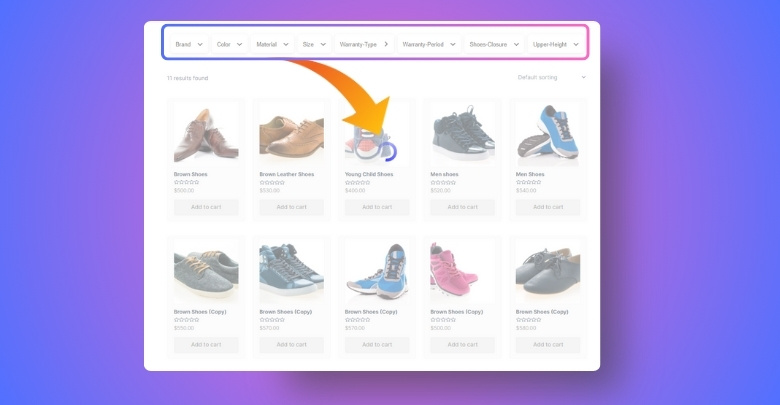
Filter System Tasks
When someone clicks a filter, the website works behind the scenes. It sorts products and hides what doesn’t match the chosen options. This action repeats every time someone selects a new filter or changes one. Even though it feels fast, your site handles lots of small steps. These actions can affect how quickly pages load. The better the setup, the faster things can run. That’s why understanding filter tasks really helps.
Page Speed Setup
Running smoothly depends a lot on how your filters are designed. If filters refresh the full page, it may take longer to load. But using AJAX means filters only update the product section quickly. That keeps users happy and the site feeling light. Many stores use smart coding methods to avoid full reloads. When filters are set up well, page speed stays steady. A smart setup really makes a big difference.
Server Load Impact
Every filter click sends a small request to your server. If too many people use filters at once, the server works harder. A weaker server may take longer to answer these filter requests. That delay makes the site feel slower for everyone using it. Using strong hosting plans helps reduce these delays during busy times. With a reliable server, filters can still work fast. Good hosting is always important for busy shops.
Plugin Performance Quality
Heavy plugins often add more pressure on your website’s performance. Some filter plugins are built with cleaner, faster code that works better. Using a trusted plugin reduces the chance of slowdowns or loading errors. Always check plugin reviews and updates before adding them to your store. Choosing the wrong plugin can lead to speed issues for your site. A lightweight plugin is better for both speed and performance. Pick quality tools for the best results.
Tips to Stay Fast
Improving site speed doesn’t always mean removing your filters completely. Try using tools like caching and CDNs to boost performance. These tools help load data faster by reducing pressure on your server. Also, keep your plugins and theme updated for smoother results. Hosting also matters; choose one that fits your traffic needs well. These simple tricks can really help your store stay fast. With smart steps, filters won’t slow you down.
Good filters help people shop faster and stay on your site. Slow websites can lose visitors and miss out on many sales. If your store runs into performance issues or you’re trying to fix WooCommerce product search problems, choosing a well-coded filter plugin with built-in optimization features can make a big difference. With simple tools, your store can stay fast and work great.
Frequently Asked Questions
Still have some questions about product filter plugins for WooCommerce? You’re not alone. Here are a few extra things people often wonder when learning about how these tools work. These FAQs will help clear up more doubts in a simple way.
Can Filters Show Out-of-Stock Products?
Yes, many filter plugins let you choose to show or hide out-of-stock items. Some stores prefer to hide them, so customers only see what’s available. Others want to display them with a message that says “not available” or “sold out.” You can adjust this setting depending on how you want your store to look.
Do Filters Work With Product Variations?
Yes, filters can work with variations like color, size, or style. If your product has multiple choices, filters help users pick the one that fits best. This means they don’t need to go through every version of the same product. It makes browsing easier and helps people find the right variation fast.
Can I Use Filters for Customer Ratings?
Some filter plugins let customers sort products by ratings or reviews. This is helpful when someone wants to see the best-rated items first. It builds trust and makes it easier to find good-quality products. You can choose whether to display star ratings or other review styles.
Are Filters Helpful for Downloadable Products?
Yes, filters can be used even if you sell digital items like ebooks or music. You can let users sort by file type, price, popularity, or category. That way, they won’t waste time clicking on items they don’t want. Filters make digital stores just as easy to explore as physical ones.
Can Filters Be Added to Landing Pages?
Many filter plugins allow you to place filters on special landing pages. You can do this using shortcodes or widgets, depending on the plugin. This is useful for pages that focus on sales, themes, or collections. It helps keep everything on one page without sending people to different parts of the store.
Do Filters Work With Product Badges?
Yes, some filters can work with badges like “new,” “sale,” or “featured.” This allows customers to see only items with those special labels. It’s a great way to highlight promotions or newly added products. You just need to make sure your plugin supports this feature.
Can Filters Help With Seasonal Products?
Filters can help customers find items based on seasons like winter, summer, or holidays. You can tag your items with seasonal labels and create filters based on those tags. This way, users can easily find what fits the current time of year. It keeps your store timely and helpful during different seasons.
Are There Filters Based on Shipping Options?
Yes, some advanced plugins let users filter by shipping features like free delivery or fast shipping. This is useful if people are in a hurry or want to save on costs. You can show only products that match the selected shipping style. It makes checkout decisions faster and easier.
Can I Add Filters for Product Brands?
Most filter plugins allow you to add brand-based filtering. If you sell products from different companies, this helps shoppers narrow down their favorites. They can just click on the brand they like and see all related items. It’s a simple way to make things more organized for brand-focused buyers.
Is It Possible to Filter Items by Popularity?
Yes, you can let customers sort products based on how popular they are. This usually means the most viewed or best-selling items come first. It helps people see what others are buying, which builds trust. Popularity filters are often used to guide new visitors to top products easily.
End Note
Customers don’t have to click page after page to find what they’re looking for when your product filter plugin works. A smooth shopping experience often leads to more purchases, and happy buyers are more likely to come back to your site. They can search for color, price, or anything else in seconds.
So, what is WooCommerce product filter plugin? It’s a tool that lets people sort and search their online products quickly using filters like price, size, or category. It saves time, improves the user experience, and often increases store sales. With AJAX support and customization options, it fits smoothly into your store design while making shopping easier for everyone.
Keep your store updated, test filter speeds on desktop and mobile, and pick a trusted plugin. You want a clean, fast, and user-friendly setup. Good luck building your store—hope you find a filter plugin that suits your needs.
